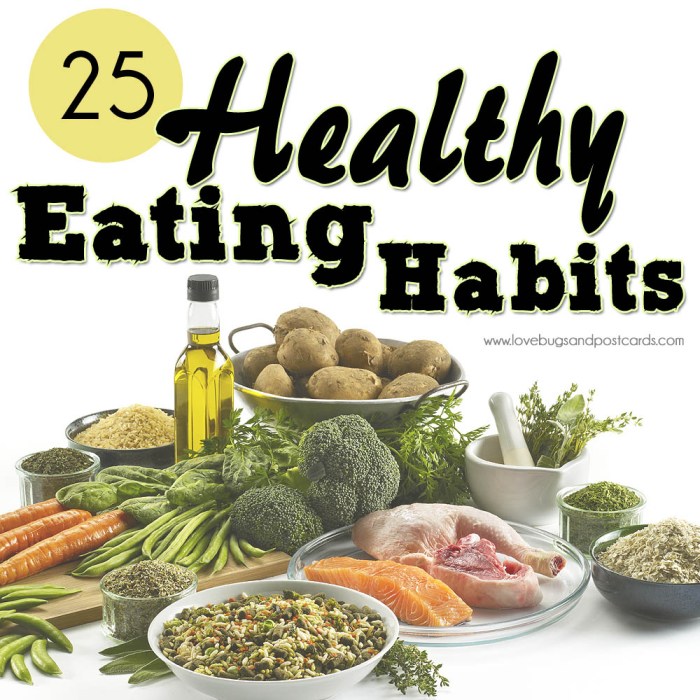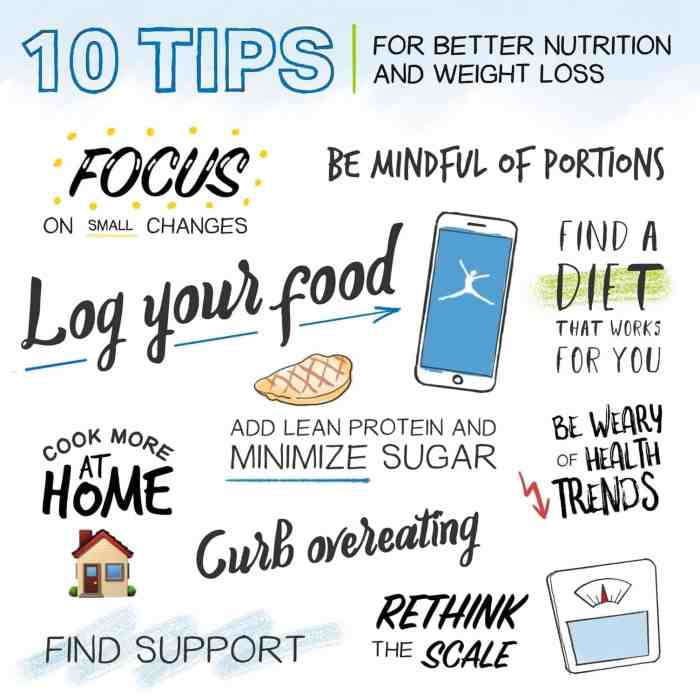Yo, let’s dive into the world of Healthy Eating Habits, where we break down the key elements of fueling your body right and feeling your best. Get ready for a journey towards a healthier you!
In today’s fast-paced world, it’s essential to prioritize what goes into your body to ensure optimal health and well-being.
Benefits of Healthy Eating Habits
Eating a diet rich in fruits and vegetables is essential for maintaining good health. These foods are packed with vitamins, minerals, and antioxidants that help boost our immune system and protect our bodies from various illnesses.
Incorporating Fruits and Vegetables
- Fruits and vegetables provide essential nutrients that are necessary for our body to function properly.
- They are low in calories and high in fiber, making them ideal for weight management and digestion.
- Regular consumption of fruits and vegetables can reduce the risk of heart disease, stroke, and certain types of cancer.
Impact on Energy Levels and Productivity
- A balanced diet consisting of whole grains, lean proteins, and healthy fats can help stabilize blood sugar levels, preventing energy crashes throughout the day.
- By fueling our bodies with nutritious foods, we can improve our focus, concentration, and overall productivity.
- Healthy eating habits also support better sleep quality, leading to increased energy levels and alertness during the day.
Reducing the Risk of Chronic Diseases
- Studies have shown that a diet rich in fruits, vegetables, and whole grains can lower the risk of developing chronic conditions such as diabetes, hypertension, and obesity.
- Antioxidants found in plant-based foods help combat inflammation and oxidative stress, which are key contributors to chronic diseases.
- By adopting healthy eating habits, we can significantly improve our overall health and well-being, reducing the burden of chronic illnesses in the long run.
Building Healthy Eating Habits
Eating healthy is all about making smart choices when it comes to food. By building healthy eating habits, you can improve your overall well-being and quality of life.
Tips for Meal Planning
- Plan your meals in advance to ensure you have nutritious options readily available.
- Include a variety of fruits, vegetables, whole grains, lean proteins, and healthy fats in your meals.
- Prepare meals in batches to save time and avoid unhealthy fast food options.
Avoiding Processed Foods
- Opt for whole foods like fresh fruits, vegetables, whole grains, and lean proteins instead of processed foods high in added sugars, salt, and unhealthy fats.
- Read labels and ingredients lists to identify processed foods and choose alternatives with minimal additives.
- Cook meals at home using fresh ingredients to have better control over what you’re consuming.
Importance of Portion Control
- Practice portion control by using smaller plates, measuring servings, and being mindful of portion sizes.
- Avoid eating straight from the package to prevent overeating and consume meals slowly to give your body time to register fullness.
- Listen to your body’s hunger and fullness cues to avoid overeating and maintain a healthy weight.
Role of Hydration, Healthy Eating Habits
- Stay hydrated by drinking plenty of water throughout the day to support digestion, nutrient absorption, and overall health.
- Limit sugary drinks and opt for water, herbal teas, or infused water for extra flavor without added sugars.
- Carry a reusable water bottle with you to encourage regular hydration and prevent dehydration.
Nutrient-Rich Foods to Include

Eating a variety of nutrient-rich foods is essential for maintaining overall health and well-being. These foods provide us with the necessary vitamins, minerals, and antioxidants that our bodies need to function optimally.
Essential Nutrients
- Vitamins: Vitamins such as Vitamin C, Vitamin D, and Vitamin E play crucial roles in supporting our immune system, promoting healthy skin, and aiding in the absorption of other nutrients.
- Minerals: Minerals like iron, calcium, and potassium are important for maintaining strong bones, regulating heart function, and supporting muscle contractions.
- Antioxidants: Antioxidants, such as beta-carotene and lycopene, help protect our cells from damage caused by free radicals and reduce the risk of chronic diseases.
Incorporating Lean Proteins
Including lean proteins like skinless poultry, fish, tofu, and legumes in your meals can help build and repair tissues, support muscle growth, and keep you feeling full and satisfied throughout the day.
Fiber-Rich Foods for Digestion
- Fiber-rich foods like whole grains, fruits, vegetables, and legumes aid in digestion by promoting regular bowel movements, preventing constipation, and maintaining a healthy gut microbiome.
- Important: Remember to drink plenty of water when increasing your fiber intake to prevent bloating and promote proper digestion.
Importance of Healthy Fats
Healthy fats, such as those found in avocados, nuts, seeds, and olive oil, are essential for brain function, hormone production, and the absorption of fat-soluble vitamins like Vitamin A, D, E, and K.
Overcoming Challenges

Cravings and unhealthy temptations can often derail our efforts to maintain healthy eating habits. Here are some strategies to help you stay on track:
Managing Cravings
- Avoid keeping trigger foods in the house to reduce temptation.
- Stay hydrated and try drinking a glass of water when cravings strike.
- Practice mindful eating to savor and enjoy your meals, reducing the urge to snack unnecessarily.
Impact of Stress and Emotional Eating
Stress and emotions can lead to poor food choices. Here’s how to combat emotional eating:
- Find alternative ways to cope with stress, such as exercise or meditation.
- Keep a food journal to track emotional triggers and patterns of emotional eating.
- Seek support from friends, family, or a therapist to address underlying emotional issues.
Tips for Dining Out
Eating out doesn’t have to mean sacrificing healthy choices. Consider these tips:
- Scan the menu beforehand and look for healthier options.
- Choose grilled, steamed, or roasted dishes over fried or creamy ones.
- Ask for dressings and sauces on the side to control portions and reduce excess calories.
Maintaining Consistency and Motivation
Consistency is key to long-term success in healthy eating. Here’s how to stay motivated:
- Set realistic goals and celebrate small victories along the way.
- Find a workout buddy or join a healthy eating support group for accountability.
- Reward yourself with non-food treats for sticking to your healthy eating plan.
